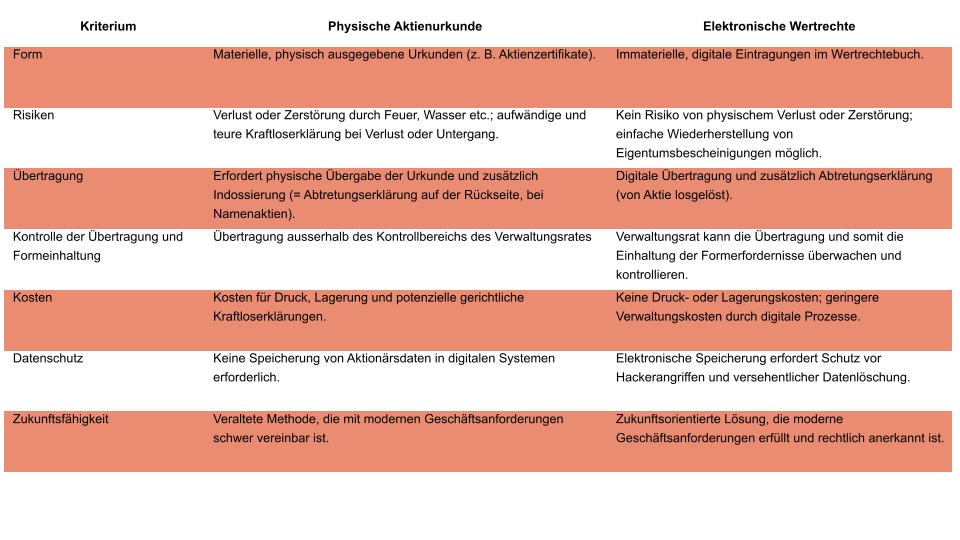Are your paper stocks still up to date? Discover how dematerializing shares in your Swiss limited company saves costs, minimizes risks and simplifies administrative processes. Read More
Introduction
Digitalization does not stop at stock corporation law either. Many Swiss companies are faced with the decision to replace their traditional paper shares with modern electronic value rights. This blog post highlights the advantages and disadvantages of both options in the context of Swiss law and shows why the dematerialization of equities is becoming increasingly important.
Table of contents
- Paper shares in Swiss law: A dying form?
- Electronic value rights: The digital alternative to paper stocks
- Risks of physical share certificates: Why companies are abolishing paper shares
- Challenges when transferring paper shares
- Benefits of digitization: Why stocks should go digital
- Legal aspects of the dematerialization of shares
Paper shares in Swiss law: A dying form?
Physical share certificates, often referred to as paper shares, are documents enshrined in Swiss stock and securities law that represent the ownership of a company's shares. They can be issued as individual share titles or as share certificates that combine several shares in one document. These documents must meet certain legal requirements, such as the indication of the nominal value, the share number and the signature of a member of the board of directors.
Despite the increasing trend towards digitization, paper stocks are still widely used in Switzerland. It is assumed that they still represent the chosen form of share for the majority of Swiss stock corporations and are therefore likely to be the most frequently used type of share. This applies in particular to small and medium-sized unlisted companies, which often stick to traditional structures.
Electronic value rights: The digital alternative to paper stocks
In Swiss stock corporation law, electronic value rights are a modern form of unsecuritized shares that serve as an alternative to paper shares. They represent a dematerialization of shares and exist only as an entry in a company's value law book. According to Swiss Code of Obligations, value rights are rights with the same function as securities, but without a physical embodiment.
There are two main types of electronic value law in Swiss stock corporation law:
- Simple value rights: These are created by entry in the issuer's value book and are transferred through a written declaration of assignment.
- Register value rights (share tokens): These are designed as cryptographic tokens on a blockchain and represent a digital substitute for securities.
Electronic value rights offer a modern, digital alternative to paper shares and enable more efficient management and transfer of shares. They are becoming increasingly important, particularly among newly founded joint stock companies in Switzerland.
Sign up for the newsletter now and stay up to date on corporate action topics!
Risks of physical share certificates: Why companies are abolishing paper shares
Paper stocks pose significant risks and disadvantages, which motivate many companies to abolish them:
- Loss: Share certificates can be lost, which leads to legal and administrative complications.
- Destruction: Destruction due to fire, water or other circumstances represents a real risk that jeopardizes the existence of the document.
- Declaration of invalidity in the event of loss or destruction: This process is costly and time-consuming, often taking up to one year.
These risks can be equally problematic for companies and shareholders and result in significant financial and administrative burdens. The Board of Directors in particular is affected by these challenges, as the replacement, revocation or adjustment of the share register is its responsibility and costs it time, money and nerves.
Challenges when transferring paper shares
The transfer of paper shares involves hurdles that make the process difficult:
- The need for physical handover: This can be impractical in an increasingly digital world.
- Complex legal requirements: Endorsment for registered shares in particular represents an often overlooked hurdle.
- Risk of incorrect transfers: Without correct endorsement, no transfer of ownership takes place.
When endorsing, the seller must write and sign a declaration of assignment on the back of the registered share. This formal requirement is largely unknown among many shareholders, which means that registered shares are often handed over without correct endorsement. As a result, ownership of the share in question is not transferred to the buyer. For the company, this results in an interrupted or faulty chain of ownership, which can result in legal, financial and administrative problems (more on this in a separate blog).
Benefits of digitization: Why stocks should go digital
Electronic value rights offer numerous advantages that speak in favor of digitizing stocks:
- Increased security: Eliminating physical risks of loss or destruction eliminates the risk of loss or destruction.
- Cost efficiency: The elimination of storage costs and the reduction of administrative expenses lead to significant savings.
- Simplified administration: Digital share accounting enables more efficient administration and reduces sources of error.
- Flexibility: New documents of ownership can be issued quickly and easily, making them easier to use.
- More efficient transfer processes: Digital processes significantly speed up and simplify legally compliant share transfers.
- Control by the Board of Directors: The Board of Directors can better monitor and manage the transfer and fulfilment of formal requirements.
These benefits make electronic value rights an attractive option for modern companies that value efficiency, security and transparency. They provide greater control over stock holdings and movements and reduce the risk of errors or irregularities during transfers.

Legal aspects of the dematerialization of shares
In Swiss law:
- Electronic value rights are legally recognized and offer a secure alternative to paper shares.
- The transfer is legally simplified, which speeds up transactions and increases legal certainty.
- Digital processes comply with modern business practices and make it easier to comply with regulatory requirements.
- The legal recognition underlines the future viability of electronic value rights in the Swiss financial sector.
This legal recognition and the associated benefits make electronic value rights a future-oriented option for Swiss companies that want to modernize their share structure.
Contact us now for a free and non-binding consultation
Conclusion
The digitization of shares through electronic value rights offers significant advantages in terms of security, efficiency and cost savings. Companies in Switzerland should seriously consider switching from paper stocks to digital forms in order to benefit from these benefits and prepare for the future.
Konsento offers electronic share registers or value registers that are free of charge for up to 150 shareholders. Konsento also supports the implementation of the legal processes for the dematerialization and declaration of invalidity of physically issued share certificates with digital, efficient and cost-effective processes. It is particularly noteworthy that the Board of Directors is informed in consensus of the specific formal requirements for each type of transfer. As part of the transfer of shares in the form of electronic value rights, he can create statements of assignment directly in the system. This makes the transition to electronic value rights particularly attractive, accessible and legally secure for Swiss companies.
Would you like to learn more about the benefits of digitizing stocks or receive support in converting paper shares to electronic value rights? contact us today for a free consultation!
Sign up for our newsletterto stay up to date on business administration.
Or follow us on social media:

